By MARILYN TINNIN • Photos by JOHNNY JENNINGS
An Indianola man’s mission to send news from home to World War II soldiers around the world
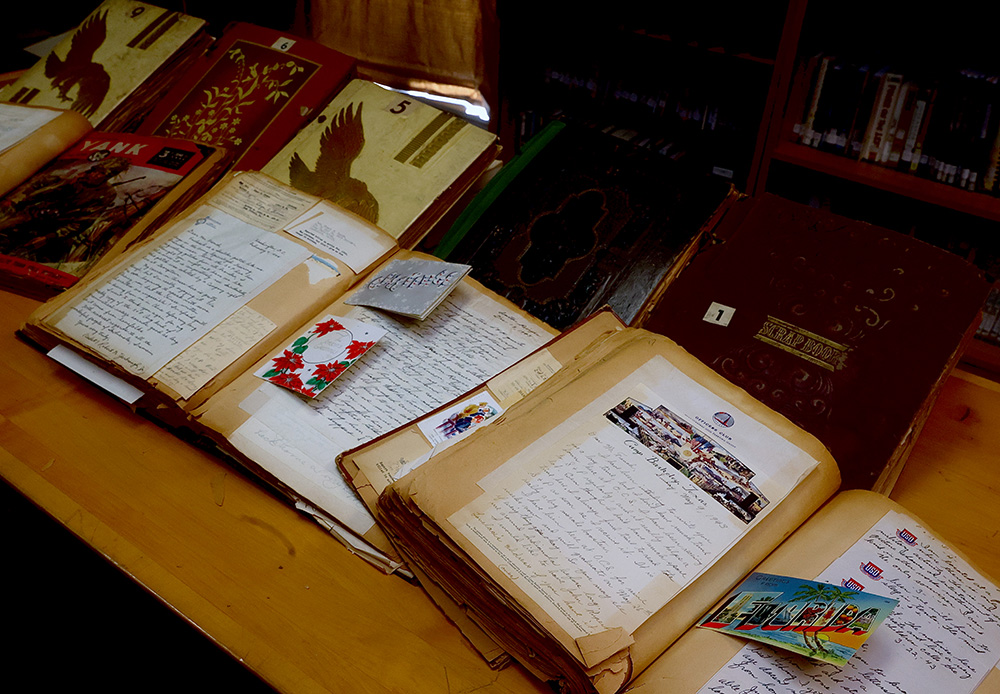
Author Marie Hemphill’s 1980 comprehensive history of Sunflower County, Fevers, Floods, and Faith, describes the “something special” that sets the Delta apart. She attributed its uniqueness to a “rare quality involving the soul of its people—their generosity, their friendliness, their willingness to accommodate, and a never-failing optimism that can survive such problems as floods, droughts, labor shortages, high taxes, and crop failures.”
Marie was my mother, and I was privy to many conversations she and my father had during the five years she spent researching and writing her book. A name she often mentioned was Willie French, an Indianola leader who had been something of a mentor to her through the years. Frequently called “the dean of local history,” Mr. French had also dreamed of writing a history of Sunflower County. He spent decades exploring musty courthouse records, traversing forgotten paths around the Sunflower River, collecting ancient letters and timeless artifacts that had survived Mother Nature’s unpredictable events often visited upon the area’s determined residents. Mr. French’s papers were invaluable to my mother, and upon publishing, she dedicated her finished 850-page masterpiece to him.
His life epitomized that generous spirit my mother described in the opening paragraphs of her book. For nearly sixty years, Willie French was one of the Delta’s most prominent movers and shakers and his name is attached to nearly every worthy civic cause from those years. Whether a goal was building a bridge across the mighty Mississippi between Greenville and Arkansas, securing funds for capital improvements in Indianola public schools, rallying support for a superb city library, bringing to fruition any project for the First Baptist Church, or overseeing the Sunflower County Board of Supervisors, Willie French was essential in getting the task accomplished.
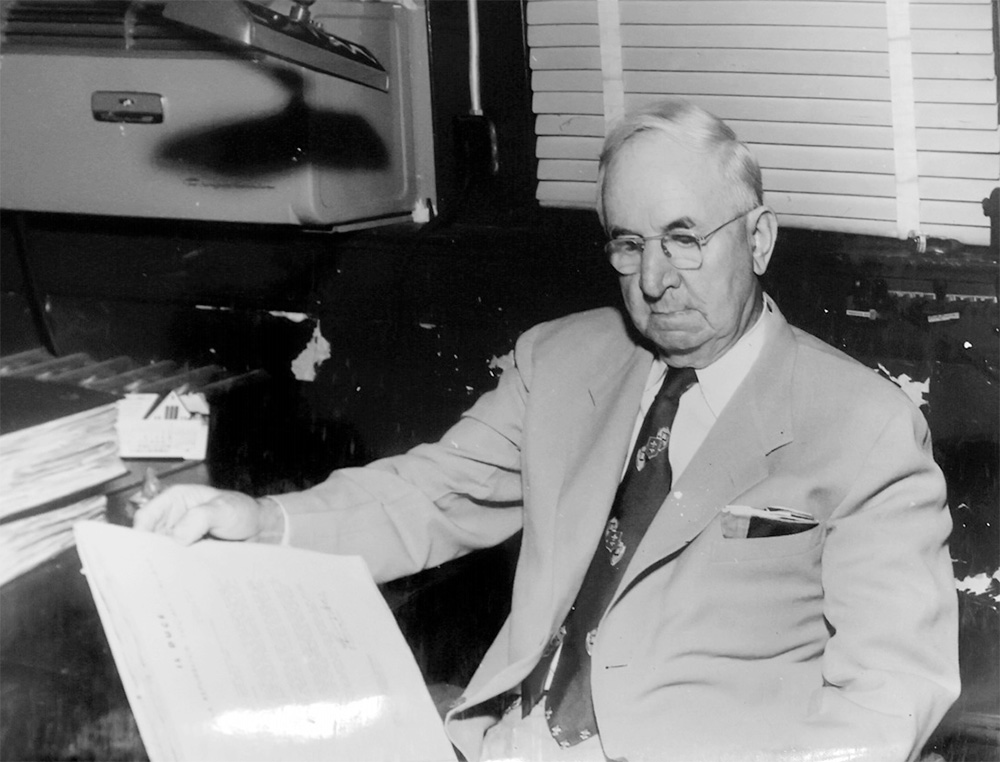
However, Mr. French’s most selfless act was encouraging those Sunflower Countians—members of the Greatest Generation—who served in the United States military during World War II. For 236 consecutive weeks, his four-page mimeographed newsletter, “Spoke and Page,” kept over 500 men and women around the globe informed of news from home. Although some kind citizens frequently contributed to the effort, helping with postage or paper expenses, the editor’s unbending rule was that he would never solicit funds, nor would he accept a nickel from the families of his subscribers, to whom he repeatedly referred as “my boys.”
William Richardson French was not a Deltan by birth. He was a Jackson, Tennessee, native who came to Indianola in 1904 as a twenty-one-year-old fresh out of business college. French took a cashier’s position at The Bank of Indianola, one of the area’s four banks that failed during the Great Depression.
The incorporated town of Indianola was barely past its infancy in 1904, but historical records reveal an enthusiastic civic spirit and an impressive esprit de corps. The city was inhabited by “doers” and “givers,” with a shared sense of calling to create a welcoming town primed for industry, business, education, and cultural growth. Willie French fit right in with those optimistic visionaries who inhabited the flatlands of the day. He embraced Indianola, and Indianola embraced him.

Right away, he became a member of the First Baptist Church. At the time, the congregation met in a small frame structure that was eventually replaced by an impressive neo-classical red brick building. Mr. French would serve as the finance chairman when the time came to initiate a building program.
He had been in his new hometown only a short time when he became smitten with one of Indianola’s most prominent young ladies, a recent graduate of Blue Mountain College. Miss Estelle Carothers’s family was active in the blossoming civic life of Indianola, with her father, W.H. Carothers, serving more than one term as mayor. In that day, the term “serving” was literal. Salaries were minute, and the word “public servant” meant precisely that.
The young couple was married in the First Baptist Church on March 22, 1906, and moved right down the street into the sprawling Victorian Carothers family home at 207 East Percy Street. They would live there for the rest of their lives, raising two sons, and taking in countless boarders over the years. Several outstanding business leaders began their lives in the Indianola community as residents of what Mr. French called “The French Peabody,” a humorous nod to Memphis’s grand hotel.
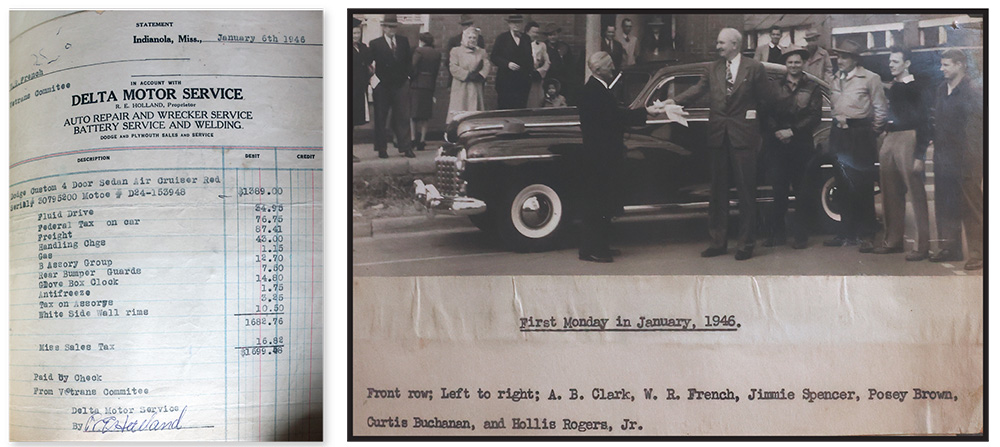
Mr. French left his position at the bank to enter the insurance business in 1912. In those initial Indianola years, he found himself saying “yes” to serving on countless boards in Indianola and across the Delta. It is not surprising that politics eventually came into the mix!
He was elected to the Sunflower County Board of Supervisors in 1926 and was re-elected eight times, serving as board president for thirty of those years. During his tenure, made it his mission to create a thriving network of roads through the primitive patchwork of dust or mud depending on the weather. The Mississippi Association of Supervisors also chose Mr. French four times as their president.
As president of the U.S. Highway 82 and Bridge Association, he headed up a distinguished committee of fellow leaders who recognized the value of a bridge linking Highway 82 at Greenville to Lake Village, Arkansas. The bridge opened in 1937 with patriotic fanfare and celebration, making Highway 82 a major thoroughfare of significant commerce ever after.
And then came World War II. As my mother wrote in her chapter on “Sunflower County at War,” “Practically every phase of living seemed to revolve around the war. Patriotism was high, and everybody wanted to help in some way. There was speculation as to what serious emergencies might arise as a result of the country’s participation in the hostilities, and Civil Defense, which was headed in Sunflower County by Supervisor W.R. French, became an important matter” (Hemphill 1980, 708).
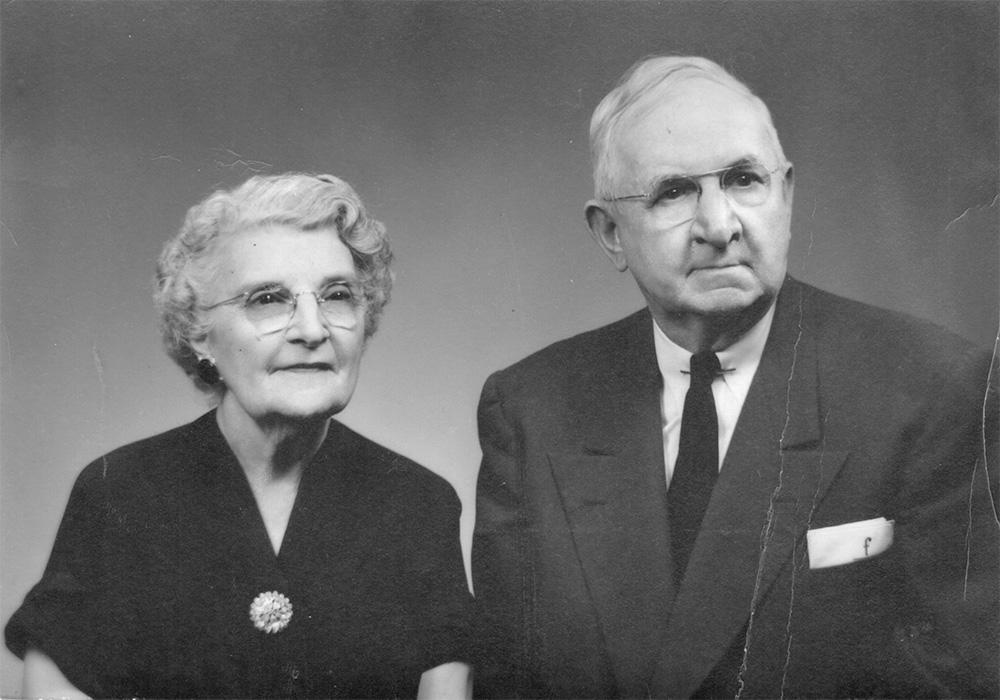
The Draft Board offices in Indianola, Ruleville, and Moorhead were bustling. Men between the ages of eighteen and thirty-seven were heading off to active duty. So many Delta recruits who had rarely been more than fifty miles from home in their lifetimes were called to hard-to-pronounce places all over the globe. The soldiers’ morale was uppermost in the minds of the folks back home.
Indianola’s Rotary Club was already publishing a weekly newsletter, “The Spoke,” and W.R. French just happened to be the editor in late 1941. Several Rotarians, who, like Mr. French, were too old for the draft, suggested the club organize a letter-writing project to see that every Sunflower County service member received news and thanks from home. Mr. French took that idea and ran with it.
He expanded “The Spoke” to include a column of his own called “My Page,” and he made a concerted effort to pack it with humor, news from those in the military, local news of weddings, births, sports scores, and folksy stories of familiar places and colorful townspeople in quasi-vignettes.
Within six months of the “Spoke and Page’s” first issue, Mr. French wrote, “This week’s edition of the “Spoke” is being mailed to boys in twenty-three different states, four foreign countries, and one ship at sea.” By the end of the war, the “Spoke and Page” had made its way to thirty-six states, Africa, Trinidad, Bermuda, Alaska, New Guinea, Fiji Islands, England, Panama, Guadalcanal, Hawaii, twenty boys at sea, and fifty-three soldiers with A.P.O. addresses via San Francisco and New York City. (French scrapbooks—newspaper clipping)
After the war, when Jackson Daily News reporter Harold Turnage interviewed Mr. French for a lengthy feature, Mr. French explained, “Well, I was writing to my own two boys in service and using a carbon copy for one of them because I was telling them both the same thing when I decided, ‘why not just send a copy to all the boys from the county who were in the service?’” (February 10, 1946—Jackson Daily News clipping—French scrapbook)
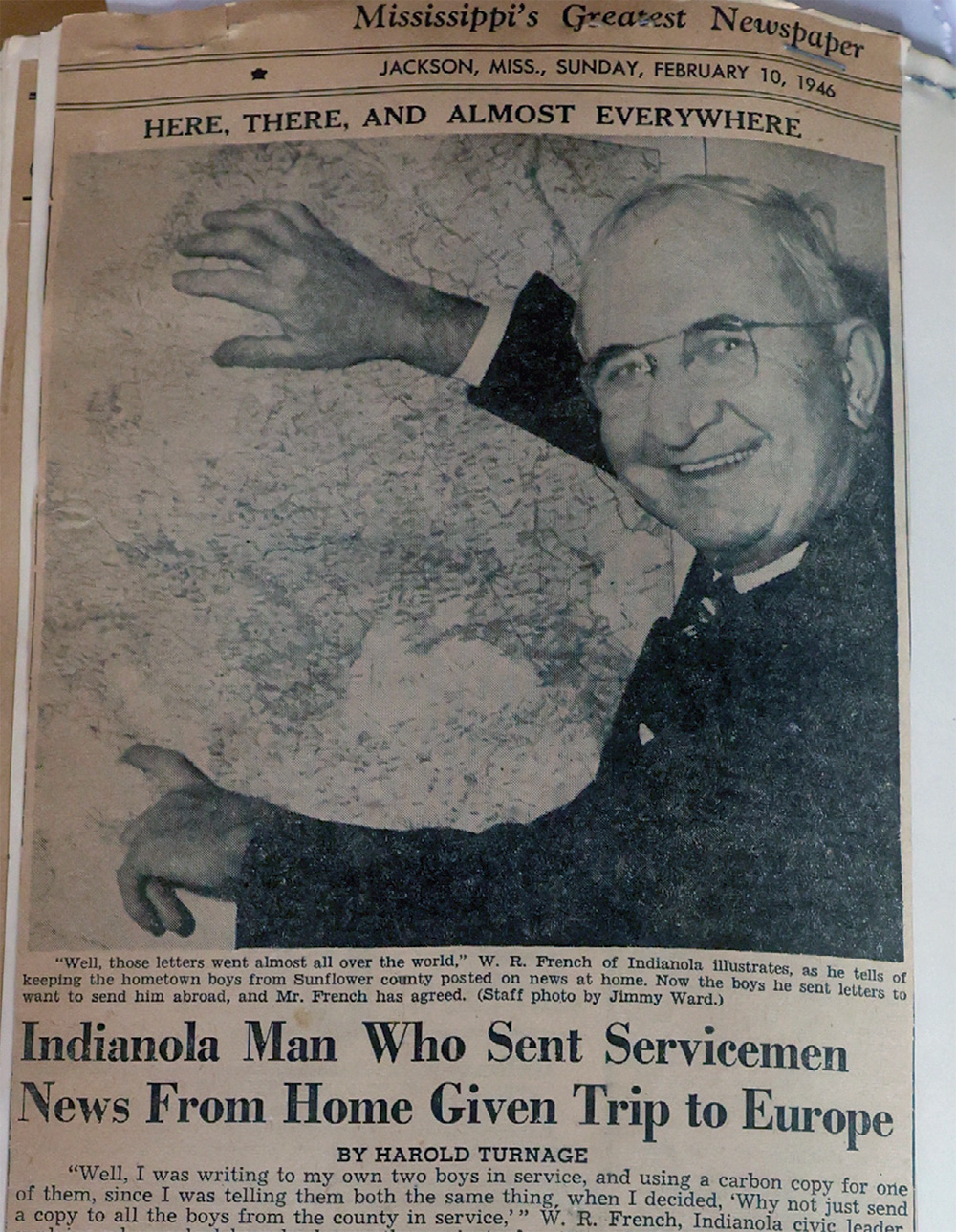
By the war’s end, Mr. French had sent out 748,800 copies of his newsletter. Letters, postcards, Christmas cards, and interesting gifts frequently made their way to Mr. French’s mailbox in return.
Grateful service men and women faithfully kept Mr. French up to date on their whereabouts. To be included in his weekly newsletter meant that friends could keep up with friends. He preserved every piece of mail from “his boys,” filling nine scrapbooks with over five thousand pieces of correspondence. Those scrapbooks reside now at the Henry M. Seymour Library in Indianola in a special archives room in a section called “The French Papers.” Fragile as they age, it is moving to read their newsy epistles and see their signatures. Many are men I recall from my growing up years in Indianola, and some names I recognize as legends who lost their lives in combat. There is something almost holy in reading these letters and realizing the writers were still young, but they demonstrated courage and every good virtue in circumstances of enormous danger. W.R. French was their hero.
News of Mr. French’s “Spoke and Page” traveled by word of mouth everywhere. Articles on W.R. French’s unique way of boosting morale for his county service members appeared in newspapers in Birmingham, New Orleans, and Memphis. Rotary clubs across the country made mention of Indianola, Mississippi’s, newsletter to the boys on the front.
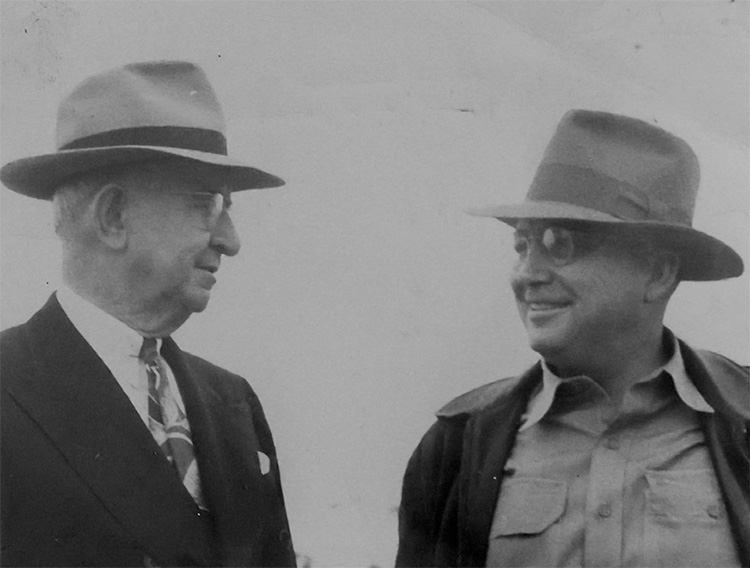
The boys’ frequently sent souvenir tokens to Mr. French including grass skirts from Hawaii, a headhunter’s knife from Fiji, a Gurkha battle knife from India, and a hand-carved ivory letter opener from Burma. Almost every “Spoke and Page” subscriber sent service emblems which Mr. French displayed on a specially made afghan. The four hundred symbols, each one worn by one of “his boys” represent all branches of the military, several rare ones such as the 20th Air Force and the Atomic Bomb force that raided Japan. The afghan offers an awe-inspiring glimpse of how far and wide the “Spoke and Page” traveled in those war years.
The fortunate soldiers who returned from their distant posts in 1945 wanted to do something tangible to show Willie French how much his weekly news had meant to them while far from home. Their first thought was to give him and Mrs. French a trip to Europe so that he could see all the places he had only read about in the letters “his boys” had sent him.
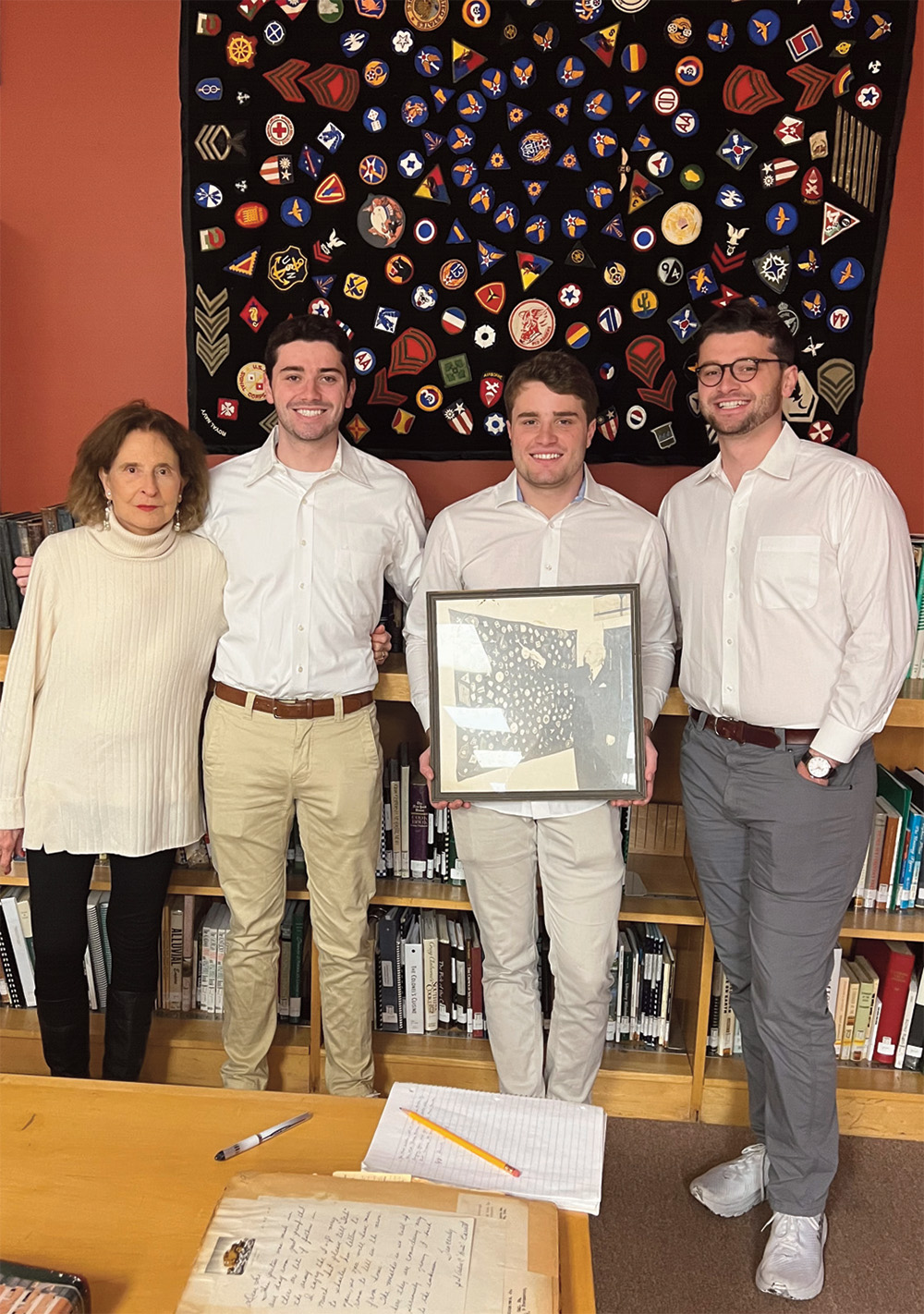
The sum of $1700 came in quickly, mostly in one or two-dollar contributions. After the Frenches’ initial excitement over the prospect of a trip abroad, the advice came back from those in the know that world conditions were not stable enough to embark on a European holiday. There was yet much healing and rebuilding to take place. It might be years before that trip could happen.
The “boys” who were eager to honor their chief encourager, W.R. French, made a quick pivot. In a public presentation on the front lawn of the Indianola Courthouse, a committee of “his boys” presented him with a brand-new Dodge sedan complete with all the bells and whistles of the day. An adoring crowd of citizens were on hand to applaud. Mr. French drove that car proudly for at least twenty years, a reminder of his particular contribution to the war effort and the strong cords of love and respect that would remain forever between him and “his boys.” D M
Photography of documents and memoribilia: The W. R. French collection; photography by Johnny Jennings, Sunflower County History Room and Archives, Sunflower County Library System, Indianola, Mississippi.




2 thoughts on “Dear Mr. French …”
Such an informative and engaging article; it is especially interesting to me as my daddy and uncle both lived at “The French Peabody” after coming home from WW2.
Very interesting article. Kudos for Mr. French for his patriotic service to the troops during WWII. And kudos for his service to so many civic, church, government and personal endeavors in his lifetime. This is a man I had never heard of until now, but he is what we all should strive to be. A person of selfless service to his newly adopted home and fireside, to his neighbors and friends, to his community, county and state, and to mankind and the world; for the betterment of all human beings. Being a veteran of the Iraq War in 2003, I know all about wanting news from home and the happenings there that you are missing out on. That was a grand thing he did for those in the service of their country, at that time. I salute you Mr. William R. French, and only wish I could have known you.